Set Up Price Points
Overview
Appcharge allows users to manage pricing points by adding them manually or uploading them in bulk using a CSV file. With support for over 80 currencies, you can update price points to reflect changes in taxes or currency rates. It’s recommended to review and update prices quarterly to keep them consistent.
The system offers options for setting tax models (included or excluded) and applying rounding rules to prices. Using the CSV upload feature, users can update multiple countries at once, with clear formatting guidelines to ensure smooth imports.
For more details, see the Supported Countries for Price Points document.
Add Price Points Manually
- Navigate to the Appcharge dashboard.
- Go to the 'Pricing' section.
- Click on “Create New Pricing” at the top right of the dashboard.
- Enter a new Price Point in USD.
Note: The price point cannot be lower than $0.8. - Adjust the prices for the specific countries where you want to apply the new price point. Ensure the prices align with your desired currency and tax settings for each country.
- Click 'Save' at the top right corner to save the new Price Point.
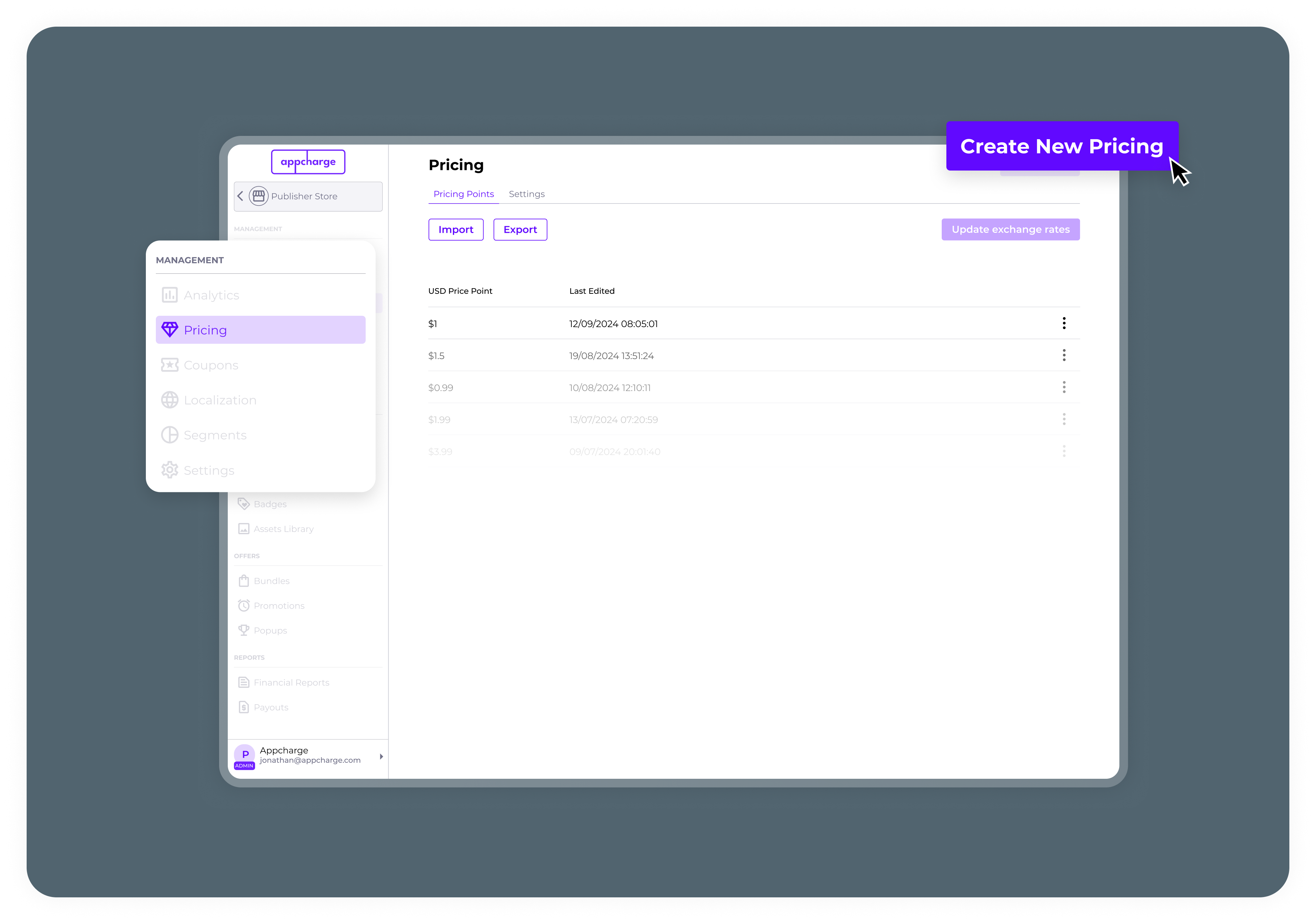
Manually Edit Existing Price Points
- Navigate to the Appcharge dashboard.
- Go to the 'Pricing' section.
- Click the three dots to the right of the price point you wish to edit.
- Select "Edit."
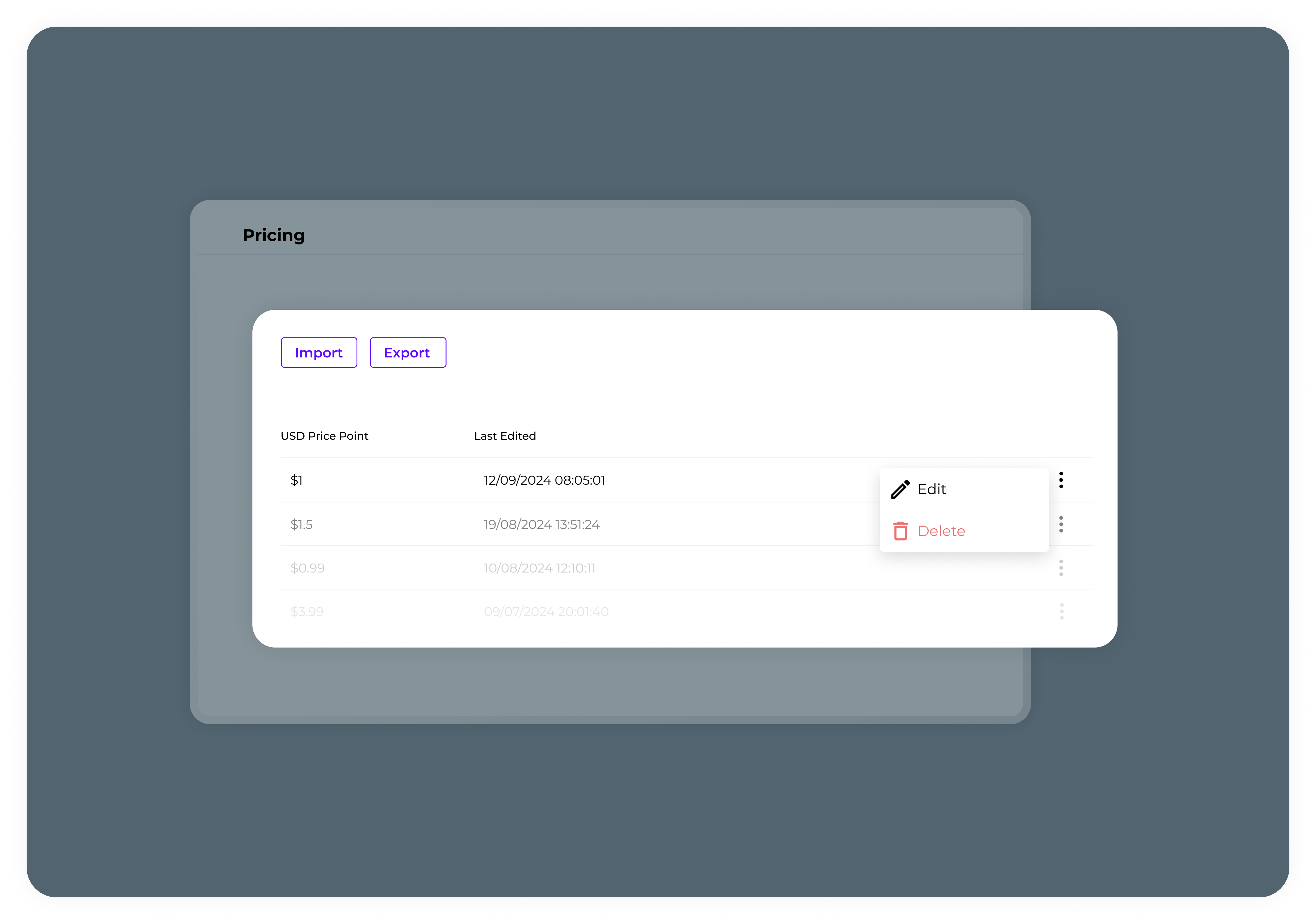
- Find the relevant country whose price you want to edit.
- Under the price column, click the pencil symbol for that country.
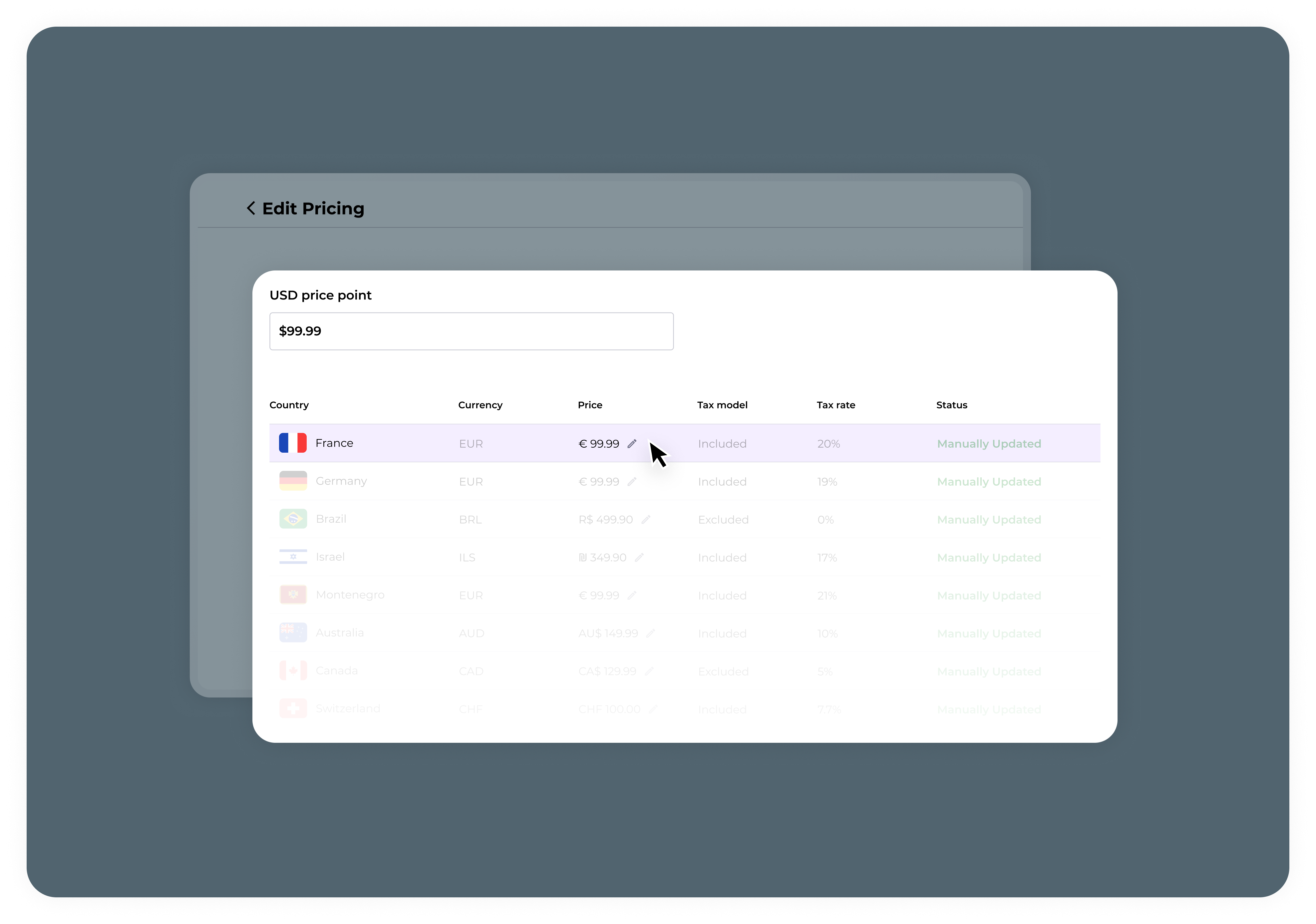
- Add the new price.
- Click 'Save' at the top right of the page.
- The status will change to 'Manually Updated' for the country you edited.
Add Price Points via CSV
- Navigate to the Appcharge dashboard.
- Go to the 'Pricing' section.
- Click 'Export' to download a pre-formatted CSV template. This template will contain all current price point data already updated in Appcharge. If no price points exist, the template will be empty.
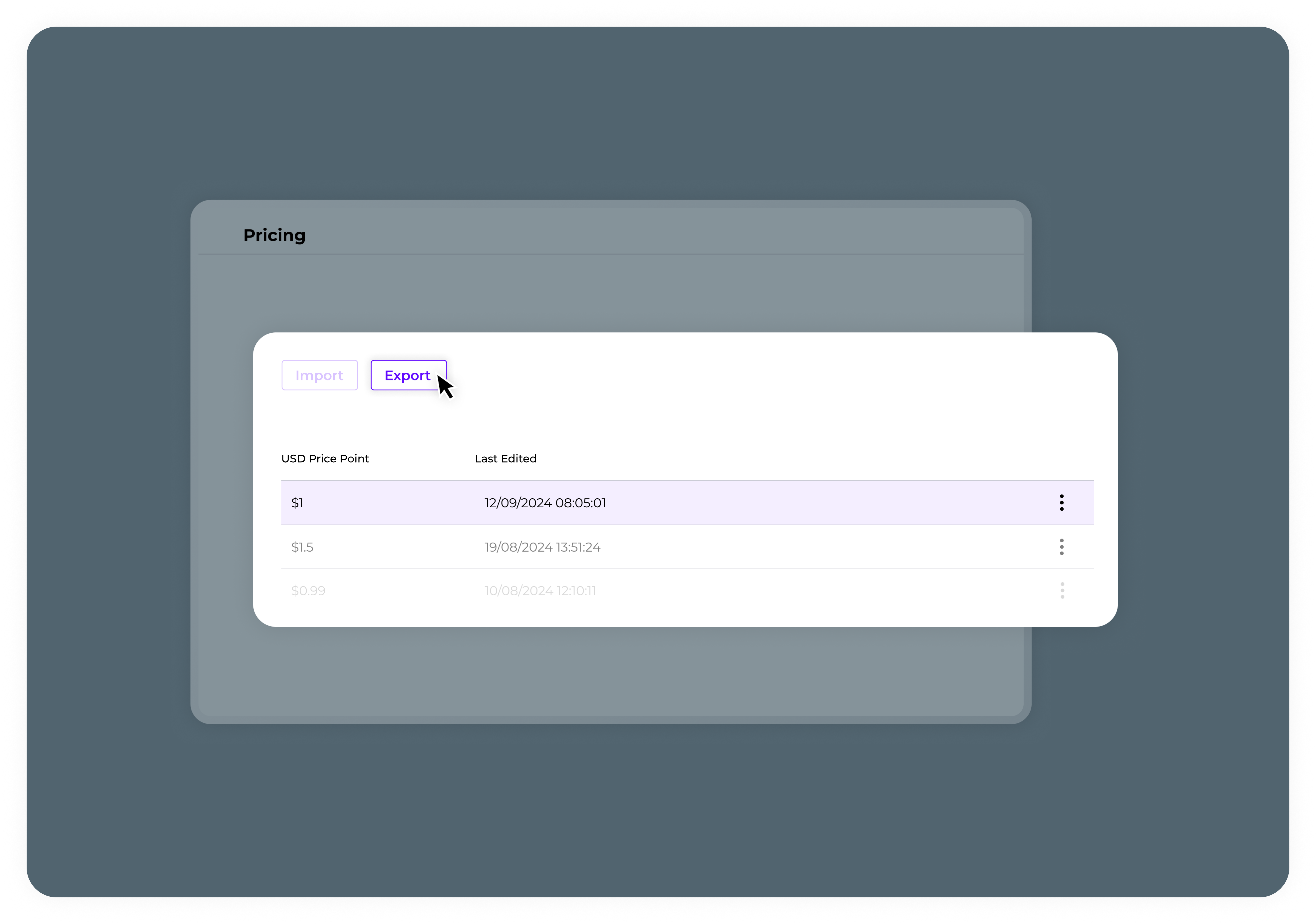
- Once the CSV template is opened, fill it with the desired price points, ensuring all conditions are met (see the conditions and format rules below).
- Upload the completed CSV file by clicking the ‘Import’ button.
CSV Format Rules
- Each column should represent a supported country. Countries must be listed using their Alpha-3 codes (not currency abbreviations). For example, the code for the United States is USA.
- The first column should always contain the USD price for the price points you're configuring.
- Each row should represent a different USD price point that you want to convert to various supported currencies. The price points in USD will be converted to their corresponding values in the local currencies for the selected countries.
- For each country (column), list the converted price in its local currency. If you choose to leave a country out, the conversion for that country will be left blank.
- Note: If the country is not supported for price points or if the price point is not configured for a specific country, the price will default to USD.
Here’s an example of how the filled-out CSV should look:
| USD price point | USA | FRA | BRA | AUS | CAN | JPN | QAT |
|---|---|---|---|---|---|---|---|
| 1.99 | 1.99 | 1.99 | 3.99 | 3.90 | 2.99 | 219 | 7.25 |
| 5.99 | 5.99 | 5.99 | 10.99 | 8.90 | 7.99 | 796 | 29.99 |
| 9.99 | 9.99 | 9.99 | 14.99 | 13.90 | 12.99 | 1107 | 45.00 |
| 15.99 | 15.99 | 15.99 | 23.99 | 19.90 | 16.49 | 1711 | 61.00 |
CSV Conditions
When uploading a CSV file, please note the following conditions:
- You can select any country supported by Appcharge for price point conversions and provide the appropriate currency values for each USD price point. To view the full list of supported countries for price point conversions, refer to this documentation.
- The CSV should use the country's Alpha-3 code, not currency abbreviations. A reference link to the correct Alpha-3 codes is provided here.
- The base price values must be between 0.8 and 5000 (USD). View our Supported Currencies documentation to see the minimum and maximum charge amount for every currency.
- For zero-decimal currencies only, if a decimal is included in the CSV, it will be ignored, and only the integer part will be used.
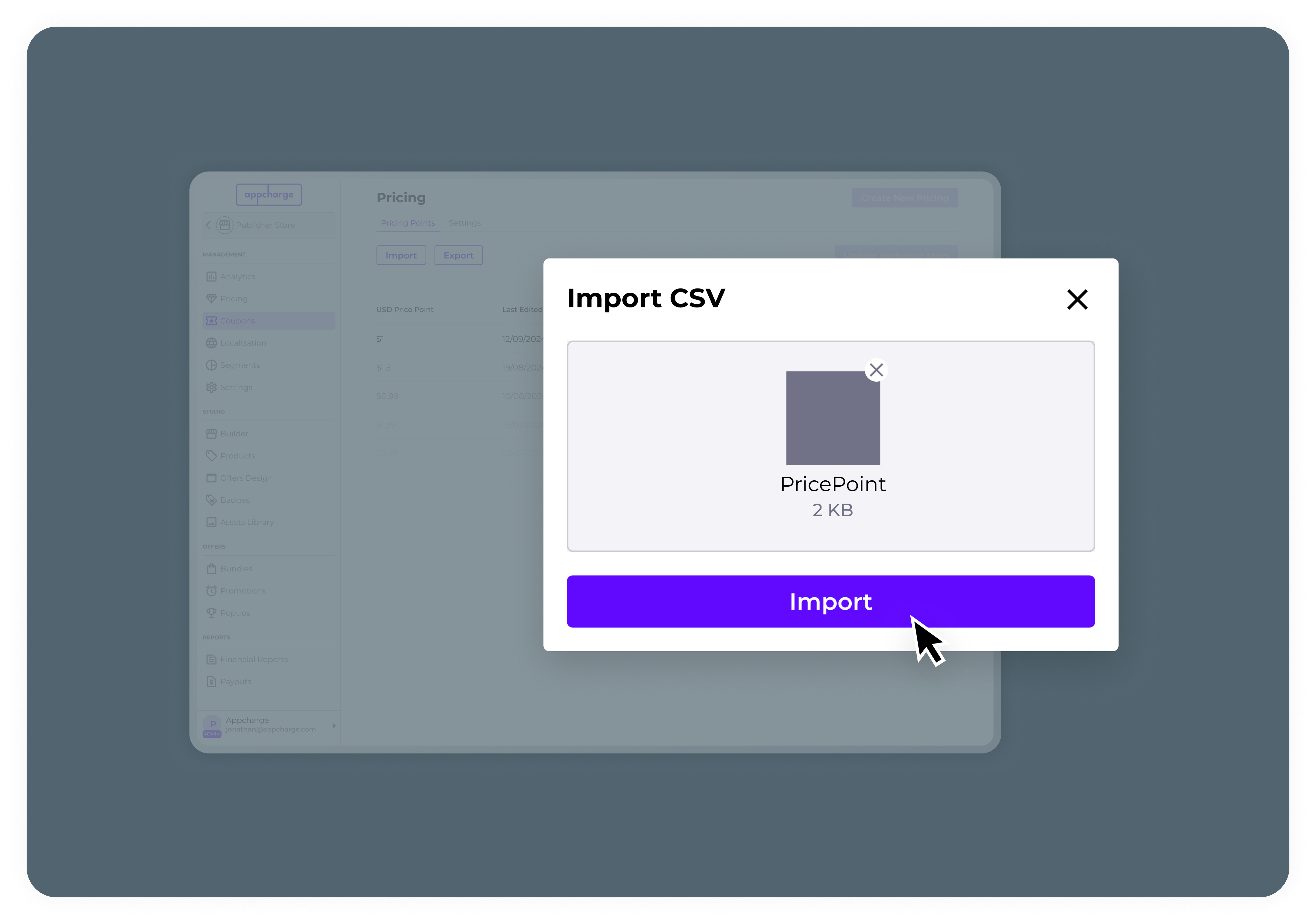
CSV Error Handling
- Unsupported or Non-Existent Country Codes:
- If the country isn’t supported or if a wrong (non-existent) country code is used, the entire CSV will not be uploaded, and an error will be displayed.
- USD Requirement
- The first column must list all of the price points in USD.
- The title of the first column must explicitly be “USD price point.”
- If these requirements are not met, the file will not be uploaded, and an error will be displayed.
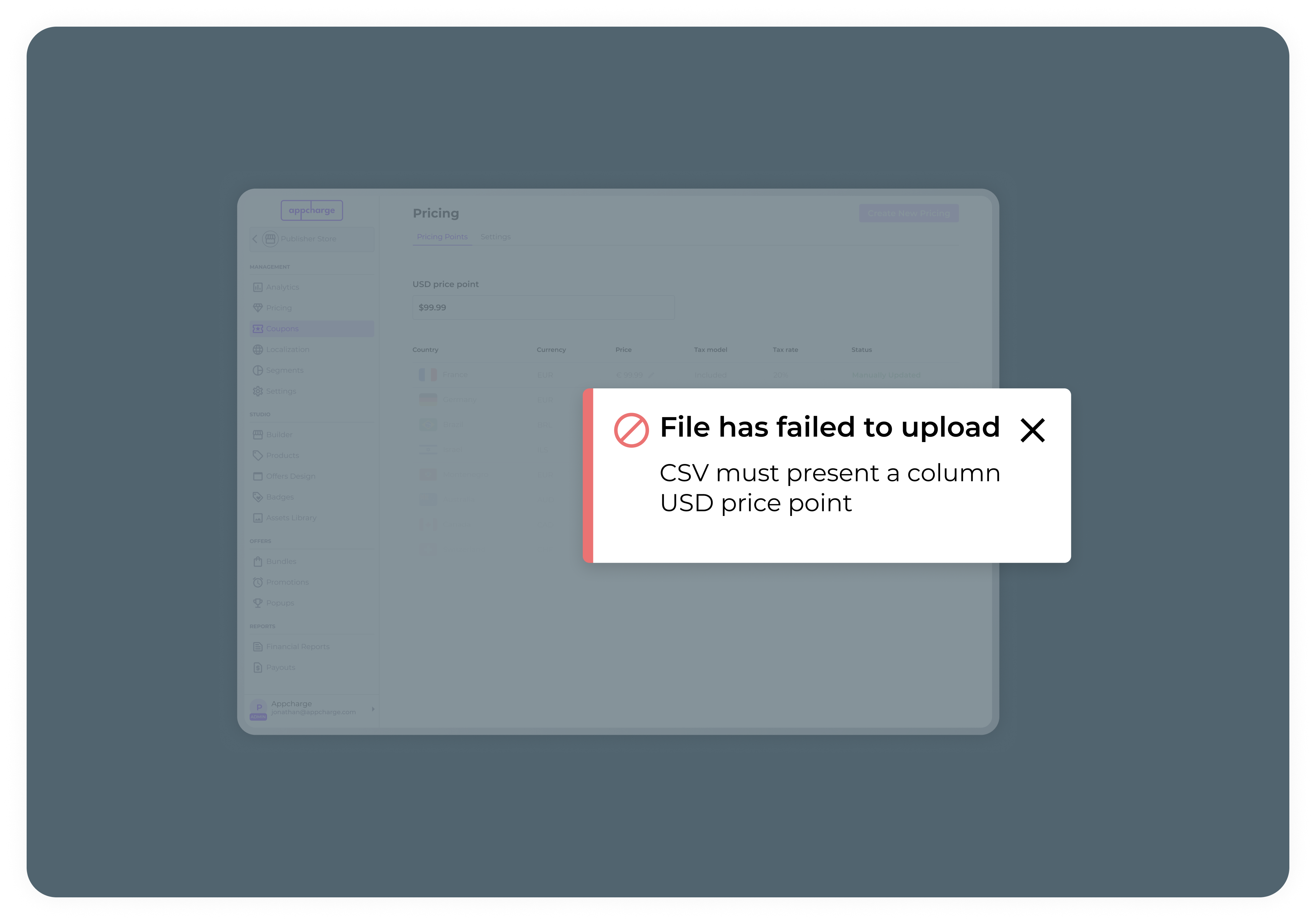
- Non-Numeric Values
- All rows (excluding the header row) must contain numeric values for price points.
- If any of the cells (beyond the header row) contain non-numeric data, the CSV will not be uploaded, and an error will be displayed.
- Out of Range Values
- If any price value is outside the supported range for its currency, an error will be returned.
- The error will include the incorrect input value and the supported range for that specific currency.
- Because the range for each currency can differ, please refer to our Supported Currencies documentation for the minimum and maximum values.
- If any price point is invalid, the entire file will not be uploaded.
Currency Exchange Rates
Currency exchange rates are used to convert USD prices to local currencies. Appcharge automatically calculates the exchange rate based on the most current rates available. However, for accuracy and consistency, it's recommended to review our Currency Conversion documentation.
Pricing Settings
In this section, we discuss the toggles available during CSV uploads. Please note that these toggles may not apply in every case, even when turned on.
‘Add Tax’ Toggle
Users can view the tax details, including whether it is included or excluded and the applicable percentage. This information varies by country and will override the default tax setting if specific price points are provided.
- Functionality: When turned on, tax will automatically be included in the price calculations.
- Exceptions: If specific price conversions are uploaded manually or via CSV, the tax will not apply even if the toggle is turned on.
‘Rounding Rules’ Toggle
- Functionality: When turned on, default price points will be rounded to .00 or .99 to make prices more attractive.
- Exceptions: This rounding will not apply to manually uploaded or CSV-uploaded specific price conversions.
- Rules: This table outlines rounding rules for converting a currency to $1, based on the conversion's decimal ending. Review the rate ranges and corresponding decimal endings (.00-.49 or .50-.99) to determine the applicable rounding rule for each scenario.
| Rate Range | Conversion Ends in .00 - .49 | Conversion Ends in .50 - .99 |
|---|---|---|
| Rate ≤ 2 | xy.09 | xy.99 |
| 2 < Rate ≤ 200 | (xy-1).90 | xy.90 |
| Rate > 200 | xyz0.00 | xyz0.00 |
| Rate with ≥ 5 digits | xxx00.00 | xxx00.00 |
Real-Life Examples for Tax and Rounding Rules
- Paris, France (Tax Included)
- Tax Rate: 20% VAT
- Rounding: Nearest €.00
- Base Price: €10
- Final Price: €12.00 (after 20% tax and rounding)
- Player Sees: €12.00
- Explanation: Price shown includes VAT and is rounded for clarity. No additional tax at checkout.
- New York, USA (Tax Excluded)
- Tax Rate: 8.875% (City and State tax)
- Rounding: Nearest $.99
- Base Price: $10
- Checkout Price: $10.99 (after adding tax and rounding)
- Customer Sees: $10.99
- Explanation: Base price displayed; tax added and total rounded at checkout for attractiveness.
Exchange rate gap threshold
Appcharge continuously manages currency exchange rate fluctuations. By default, if an exchange rate changes by 10% or more, an error is displayed in the Publisher Dashboard. You can override this default by setting custom minimum and maximum percentage thresholds. If a price point's exchange rate goes beyond these limits, an error appears. You can also apply these thresholds to a specific range of price points.
Final Price Calculation
The final price for each item is calculated by first converting the USD price to the target currency, then adding the applicable tax, and finally applying the rounding rules.
For more details, users can learn more in the tax section of the dashboard.
Updated 4 months ago
